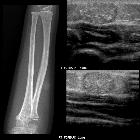Atherom







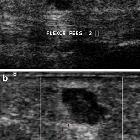

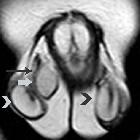


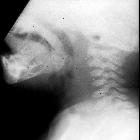



















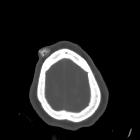




















 nicht verwechseln mit: atheroma
nicht verwechseln mit: atheromaProliferating trichilemmal cysts, sometimes known as proliferating trichilemmal tumors, are dermal or subcutaneous tumors with squamoid cytologic features and trichilemmal-type keratinization, which usually arise in the scalp.
Terminology
A variety of names have been used for this pathology, including proliferating epidermoid cyst, pilar tumor of the scalp, proliferating epidermoid cyst, giant hair matrix tumor, hydatidiform keratinous cyst, trichochlamydocarcinoma, and invasive hair matrix tumor .
Epidemiology
Proliferating trichilemmal cysts have female predominance .
Associations
Some cases have a syndromic association:
Clinical presentation
Proliferating trichilemmal cysts present as lobulated masses within the scalp. They vary considerably in size from a few millimeters to large masses many centimeters in diameter. Occasionally clinical presentation will be with superimposed infection or malignant transformation, although both of these complications are uncommon .
Pathology
Although they are mostly benign, there are also local invasive and malignant types . The latter show extensive epithelial proliferation, variable cytologic atypia and mitotic activity.
Radiographic features
CT
Proliferating trichilemmal cysts usually are located within the scalp and appear as multiple complex subcutaneous solid or cystic masses. The cystic components contain high-density proteinaceous material which sometimes layers dependently . Ring-like patterns of mineralization are also encountered .
History and etymology
Proliferating trichilemmal cysts were first described by Edward Wilson Jones, an English dermatopathologist, in 1966 .
Differential diagnosis
In some situations, consider an epidermal inclusion cyst
See also
Siehe auch:
- intrakranielle Epidermoidzyste
- epidermale Inklusionszyste
- Ganglion (Überbein)
- Epidermoid in der Kalotte
- Neurofibrom
- Dermatofibrosarcoma protuberans
- Epidermoidzyste Finger
- intraventricular epidermoid
- testicular epidermoid cyst
- epidermale Inklusionszyste der Mamma
- Atherom Galea
- Fasciitis nodularis
- Epidermoidzyste vs Dermoidzyste
- kutane Metastasen
- Malherbe-Tumor
- atheroma
- reifes zystisches Teratom
und weiter:
- Mega Cisterna magna
- Arachnoidalzyste
- Rathke Zyste
- Cholesteatom
- ASP-Assoziation
- Pinealiszyste
- Gardner-Syndrom
- Tumor Kleinhirnbrückenwinkel
- Ecchordosis physaliphora
- Dermoidzyste
- Dandy-Walker continuum
- neuroglial cyst
- Blake's-Pouch-Zyste
- Keimzelltumor
- Akroosteolyse
- erworbenes Cholesteatom
- ependymal cyst
- Cholesteatom des äußeren Gehörgangs
- hypothalamic lesions
- intraossäre Epidermoidzyste
- testicular epidermoid
- Steatocystoma multiplex
- zystische Läsionen in der Hypophyse
- Dermoid Schädelkalotte
- congenital cholesteatoma
- Epidermoid
- white epidermoid
- diffusionsgewichtete Bildgebung
- periurethral cystic lesions
- Epidermoidzyste im Kleinhirnbrückenwinkel
- Galealipom
- mostly / purely cystic pituitary region masses
- diffusion MRI of an epidermoid tumor
- Epidermoidzyste der Kalotte
- Neoplasien der Cauda equina
- zystische Läsionen der Sellaregion
- mikrozystisches Meningeom
- calcifying epithelioma of Malherbe
- epidermoid cyst of the cauda equina
- Läsionen der Fingerspitze
- cystic extraaxial mass
- extratestikuläre intraskrotale Epidermoidzyste
- sutural epidermoid cyst
- cutaneous epidermal cyst
- epidermale Inklusionszyste der Zunge
- Merkspruch Keimzelltumoren
- Nasoalveoläre Zyste

 Assoziationen und Differentialdiagnosen zu epidermale Inklusionszyste:
Assoziationen und Differentialdiagnosen zu epidermale Inklusionszyste:






